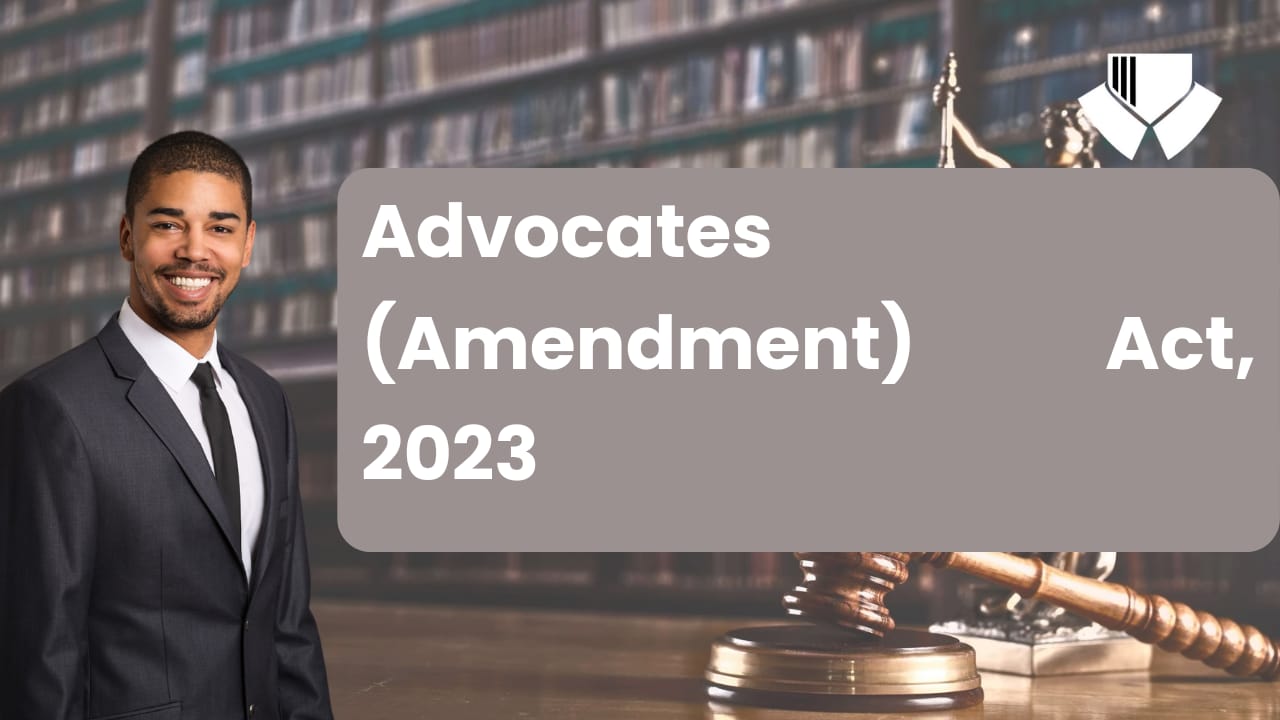By Nandhini,Vivekananda College of Law,Karnataka State Law University
Introduction:
The Advocates (Amendment) Act, 2023, stands as a watershed moment in the ongoing evolution of India’s legal framework. Enacted on December 8, 2023, this legislation, officially designated as Act No. 33 of 2023, heralds a transformative chapter in legal reforms. At the core of this amendment lies the concerted effort to combat the longstanding issue of ‘touts’ within the intricate web of the legal system. The historical backdrop reveals a departure from the obsolete Legal Practitioners Act, 1879, as the legislature embraced a forward-looking approach. The Act meticulously addressed the intricacies of legal practice, steering away from superfluous enactments and archaic laws that had outlived their utility. With a keen eye on efficiency, fairness, and transparency, the Advocates (Amendment) Act, 2023, introduced pivotal changes to the existing Advocates Act, 1961.
In this brief, we delve into the intricacies of this groundbreaking amendment, exploring its historical underpinnings, the nuanced objectives it seeks to achieve, and the broader implications on the legal landscape. As we navigate through the various facets of this amendment, the goal is to unravel the significance of this legislative milestone and its potential impact on the administration of justice.
History of the bill:
The roots of the Advocates (Amendment) Act, 2023, can be traced back to an era marked by the enactment of the Legal Practitioners Act, 1879. The socio-legal milieu of that time necessitated a consolidated legal framework, leading to the birth of a legislation that, over the decades, revealed its shortcomings. With the passage of time and a changing legal landscape, the need for comprehensive reforms became undeniable. The subsequent advent of the Advocates Act, 1961, marked a pivotal moment in the evolution of legal regulations in post-independence India. This act, while transformative, retained certain provisions from its predecessor, the 1879 Act. However, as the legal fraternity grappled with emerging challenges, the Advocates (Amendment) Act, 2023, emerged as a timely response, discarding the vestiges of an era that no longer resonated with contemporary legal needs.
Object of the Act:
The primary objective of the Advocates (Amendment) Act, 2023, was to eradicate the menace of ‘touts’ from the legal system. The term ‘tout’ was clearly defined, encompassing individuals who sought or procured the employment of a legal practitioner in exchange for remuneration. The Act aimed to provide High Courts, district judges, sessions judges, district magistrates, and revenue officers with the authority to frame and publish lists of proven touts. This pivotal amendment sought to streamline legal procedures, ensuring fairness and transparency in the legal profession.
Beyond this immediate objective, the amendment also aspires to rid the legal framework of superfluous enactments and archaic laws. By repealing the Legal Practitioners Act, 1879, the legislature signals a departure from outdated legal paradigms, embracing a modern, dynamic approach to legal practice.
Important provisions:
Central to the Advocates (Amendment) Act, 2023, are provisions designed to empower authorities to compile and publish lists of touts. High Courts, district judges, sessions judges, district magistrates, and revenue officers find themselves entrusted with the responsibility of framing these lists. Subordinate courts, in turn, are tasked with conducting inquiries into individuals suspected of being touts, ensuring due process through opportunities for individuals to present their case. The punitive measures embedded in the legislation add teeth to its provisions. Individuals proven to be acting as touts, while listed, face imprisonment up to three months, fines up to Rs 500, or both. This comprehensive approach not only addresses the identification of touts but also serves as a deterrent against unethical practices within the legal ecosystem.
The Advocates Act, 1961 was enacted to amend and consolidate the law relating to legal practitioners for the constitution of bar councils and for the constitution of All India Bar Council. The Advocates (amendment) Act 2023 amends and adds to the provisions of the Advocates Act 1961. With this amendment the legislature wishes to curb the problem of Touts faced by real advocates who are duly authorized to practice by law and have requisite qualification andcertifications to provide legal services and plead before the court. The Act defines “tout” as a person who acts as a middleman and demands consideration for bringing cases to a genuine legal practitioner. Further the Act allows to impose fine on such persons and punish with imprisonment.
| Sl. No | PROVISIONS | SUMMARY |
| 1. | PURPOSE | The purpose of the act is to further amend the Advocates Act, 1961. And cover matters relating to “touts” and repel of the obsolete law of Legal Practitioners Act, 1879. |
| 2. | INSERTION OF SECTION 45A POWER TO FRAME AND PUBLISH LISTS OF TOUTS. | Every High Court, District Judge, Sessions Judge, District Magistrate, and every Revenue-officer, not being below the rank of a Collector of a district may frame and publish lists of persons proved to their satisfaction of any subordinate Court as provided by evidence of general repute or otherwise, habitually acts as touts, and may from time to time, alter and amend such lists. The authority empowered to frame and publish a list of touts may send to any Court subordinate to such authority the names of any person alleged or suspected to be touts, and order that Court to hold an inquiry in regard to such persons; and the subordinate Court shall thereupon hold an inquiry of showing cause in the enquiry of declaring “tout” the person so alleged have opportunity to show cause of why such inclusion should not be made. The subordinate Court shall report to the authority and if the Court is satisfied that the person is tout the authority may include the name of any person in the list of touts framed and published by that authority. If any person who acts as tout when they have been mentioned in the list of touts shall be punishable with imprisonment which may extend to 3 months or a fine of Rs. 500/- or both. The word “tout” has been defined as one who procures, in consideration of any remuneration moving from any legal practitioner, the employment of legal practitioner in any legal business; or who proposes to any legal practitioner or to any person interested in any legal business to procure, in consideration of any remuneration moving from either of them, the employment of legal practitioner in such business. |
Need and Significance:
The Advocates (Amendment) Act, 2023, assumes significance not only for its immediate impact on the issue of touts but also for its broader implications. By discarding the antiquated Legal Practitioners Act, 1879, the amendment aligns with the government’s commitment to reducing legislative clutter and ensuring that the legal framework remains relevant and responsive to contemporary needs. This legislative milestone holds the potential to redefine the ethical contours of legal practice, fostering an environment where justice is not only dispensed but is seen to be dispensed with integrity. As the legal fraternity grapples with ongoing challenges, the Advocates (Amendment) Act, 2023, serves as a beacon, guiding the profession towards a future marked by efficiency, fairness, and unwavering ethical standards. In subsequent sections of this exploration, we will delve deeper into the specific provisions of the amendment, dissecting their implications and potential challenges. Additionally, we will explore the reactions and feedback from legal experts, academics, and the wider public, providing a holistic perspective on the Advocates (Amendment) Act, 2023.
Criticism and Limitations:
While the Advocates (Amendment) Act, 2023, received support from various quarters, it did not escape criticism. Some argued that the Act did not go far enough in addressing broader issues within the legal profession. Critics questioned whether focusing solely on touts would address the root causes of inefficiencies and delays in the legal system. Additionally, concerns were raised about potential misuse of the provisions and the need for stringent safeguards to prevent arbitrary inclusion in the list of touts.
One prominent critique revolves around the perceived narrow focus of the Act, with critics arguing that it falls short in addressing broader systemic issues within the legal profession. The Act’s exclusive concentration on touts, while significant, may not comprehensively address the root causes of inefficiencies and delays in the legal system. Critics contend that a more expansive approach, targeting overarching structural challenges, is imperative for sustained and holistic legal reform.
Delving deeper into the criticism, some legal experts contend that the Act, by concentrating primarily on the identification and punishment of touts, may inadvertently overlook the root causes of inefficiencies in the legal system. Issues such as backlog, procedural delays, and resource constraints persist, and a more comprehensive legal reform strategy may be necessary to alleviate these systemic challenges. Addressing these criticisms requires a delicate balancing act between the imperative to curb unethical practices and the need to ensure fairness, due process, and systemic improvements. Striking this balance necessitates ongoing dialogue, collaboration between legal experts and policymakers, and a commitment to refining the Act based on empirical feedback and evolving realities within the legal fraternity.
Conclusion:
The Advocates (Amendment) Act, 2023, represented a crucial step in legal reforms, specifically targeting the eradication of touts from the legal system. By repealing the outdated Legal Practitioners Act, 1879, and amending the Advocates Act, 1961, the government demonstrated its commitment to streamlining legal practices and eliminating obsolete laws. While the Act addressed a pressing issue, its success in achieving broader legal reforms remains a subject of ongoing debate. The legal landscape continues to evolve, and further amendments and reforms may be necessary to ensure a fair, transparent, and efficient legal system. The Act’s success in repealing the archaic Legal Practitioners Act, 1879, is a testament to the government’s commitment to decluttering the legal landscape. By amending the Advocates Act, 1961, the legislature exhibited a proactive approach to modernize legal practices, ensuring that they are relevant to contemporary societal needs. The legal landscape is dynamic, responding to societal changes, technological advancements, and evolving jurisprudential considerations. The Advocates (Amendment) Act, 2023, must be viewed as part of an evolutionary process rather than a final destination. The ongoing discourse surrounding legal reforms should be seen as an opportunity for continuous improvement, adaptability, and responsiveness to the ever-changing needs of justice administration. Looking ahead, the government, legal experts, and stakeholders must remain vigilant to the evolving challenges within the legal system. Further amendments and reforms may be necessary to address emerging issues, harness technological advancements for judicial efficiency, and foster an environment where justice is not only accessible but is dispensed swiftly and fairly.


